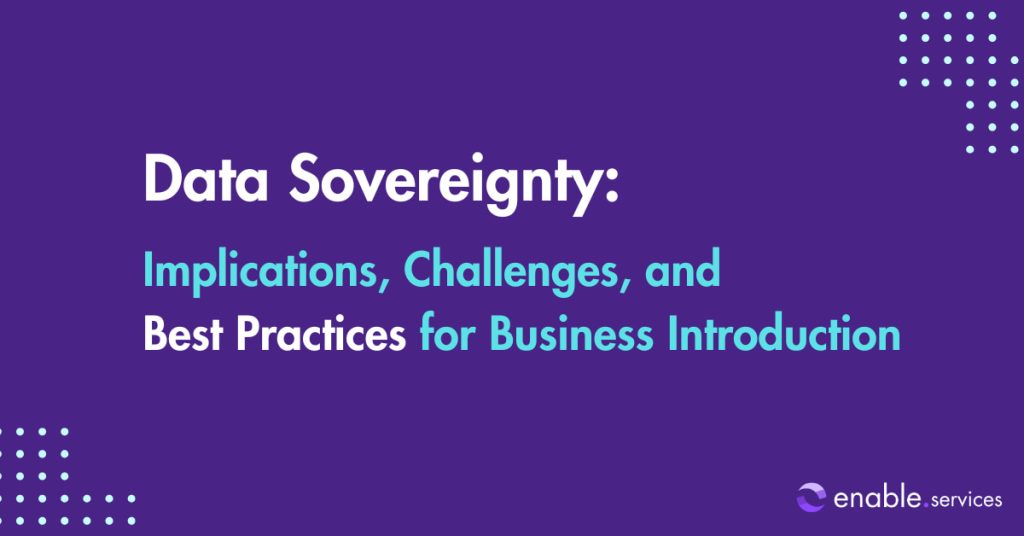Introduction
Data sovereignty refers to the principle that data is subject to the laws and governance structures of the country in which it is collected or stored. For UK-based entities, this necessitates compliance with regulations such as the General Data Protection Regulation (GDPR) and The Data Protection Act of 2018, which mandate stringent requirements for the protection and privacy of personal data. Compliance with these regulations not only ensures legal adherence but also fosters customer trust, enhancing the reputation and credibility of entities operating within the UK and globally.
The Political and Regulatory Landscape
The choice of data storage location has far-reaching implications for security, performance, and accessibility. While cloud computing offers scalability and flexibility, concerns over data residency and jurisdictional issues underscore the importance of choosing providers with robust data sovereignty measures. Data sovereignty intersects with broader geopolitical dynamics, particularly following Brexit. The EU’s adequacy decision, recognizing the UK’s data protection framework as sufficient, provides assurance for cross-border data flows until 27 June 2025. Beyond this date, the European Commission will reassess the adequacy decision, influencing future data transfer protocols.
Key Concepts: Data Sovereignty, Residency, and Localization
- Data Residency: Refers to the physical location where data is stored. This can influence how data is managed and protected, whether stored on local servers or in international cloud infrastructures.
- Data Sovereignty: Involves the legal jurisdiction governing the data, determining how it is managed, used, and secured based on the laws of the country where it resides.
- Data Localization: The practice of requiring data to be stored and processed within a specific country to comply with local regulations, protect national security, or ensure data accessibility during disruptions.
Global Perspectives: Lessons from Australia
The Australian landscape illustrates the growing emphasis on data residency following significant data breaches, such as the OPTUS incident, which exposed vast amounts of personal data to cyber threats. This event heightened cybersecurity awareness and accelerated the push for local data storage, particularly within the public sector, where government agencies have strongly advocated for data to be kept within national borders.
Importance of Data Sovereignty for Businesses
- Legal Compliance: Businesses must adhere to local data protection laws to avoid legal and financial penalties.
- Data Protection: Ensures control over sensitive data, safeguarding it from unauthorized access and breaches.
- Business Continuity: Facilitates reliable data access during disruptions, reducing legal and technical barriers.
- Competitive Advantage: Demonstrating robust data protection and compliance can build customer trust and differentiate businesses in competitive markets.
Challenges of Data Sovereignty
- Cross-border Data Flows: Complexities in transferring data internationally can increase operational costs.
- Data Localization Requirements: Establishing local data infrastructure to meet legal mandates can be resource intensive.
- Regulatory Compliance: Navigating diverse data protection laws across jurisdictions adds complexity.
- Cybersecurity Risks: Centralized data storage may attract cyber threats, necessitating advanced security measures.
- International Data Sharing: Differing national regulations can hinder seamless data exchange.
Best Practices for Ensuring Data Sovereignty
- Conduct Data Audits: Regularly review data storage, processing, and transmission practices to identify risks.
- Implement Data Localization: Store sensitive data within the jurisdiction of collection to comply with local laws.
- Adopt Robust Data Protection Measures: Utilize encryption, access controls, and continuous monitoring.
- Develop Comprehensive Data Protection Policies: Clearly outline data handling and security protocols.
- Select Cloud Providers with Data Residency Options: Ensure cloud services align with jurisdictional requirements.
- Stay Informed on Regulatory Changes: Regularly update policies to reflect evolving data protection laws.
Conclusion
Data sovereignty is a critical consideration for businesses navigating the complexities of global data management. By understanding its implications, addressing associated challenges, and implementing best practices, organizations can ensure legal compliance, protect sensitive information, and maintain business resilience in an increasingly interconnected digital landscape.





